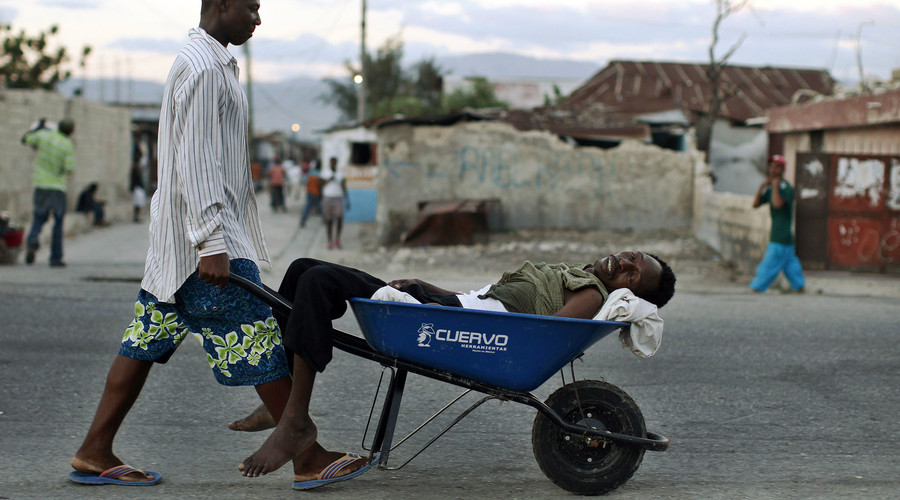-
Tips for becoming a good boxer - November 6, 2020
-
7 expert tips for making your hens night a memorable one - November 6, 2020
-
5 reasons to host your Christmas party on a cruise boat - November 6, 2020
-
What to do when you’re charged with a crime - November 6, 2020
-
Should you get one or multiple dogs? Here’s all you need to know - November 3, 2020
-
A Guide: How to Build Your Very Own Magic Mirror - February 14, 2019
-
Our Top Inspirational Baseball Stars - November 24, 2018
-
Five Tech Tools That Will Help You Turn Your Blog into a Business - November 24, 2018
-
How to Indulge on Vacation without Expanding Your Waist - November 9, 2018
-
5 Strategies for Businesses to Appeal to Today’s Increasingly Mobile-Crazed Customers - November 9, 2018
United Nations admits role in Haiti’s deadly 2010 cholera outbreak
“Over the past year, the United Nations has become convinced that it needs to do much more regarding its own involvement in the initial outbreak and the suffering of those affected by cholera”, the United Nations secretary general’s deputy spokesperson Farhan Haq wrote in an email, according to the New York Times.
Advertisement
The draft report The New York Times obtained, prepared by special rapporteur on extreme poverty and human rights Philip Alston and commissioned by the UN, says the epidemic “would not have broken out but for the actions of the United Nations”.
A class action suit was brought on behalf of victims of a cholera outbreak in Haiti contending UN peacekeeping forces from Nepal brought the disease to the island nation following a massive quake in January 2010, which killed more than 220,000 people and displaced 1.5 million. A group of 5,000 residents are now attempting to sue the organization, filing a class action lawsuit in a NY court in 2013, but the United Nations claims diplomatic immunity against any legal action.
On Friday, a United Nations spokesman said for the first time that the organization is mulling offering some form of compensation to victims of the disease that has sullied the reputation of the global organization and of the Nepalese peacekeepers who are believed to have introduced the disease into Haiti.
The US courts have rejected claims for compensation filed by victims’ families.
A U.N. acknowledgement that it played a role in introducing cholera to Haiti and vows to aid victims were welcomed Friday in the Caribbean nation, which has experienced the worst outbreak of the disease in recent history.
“This is a groundbreaking first step towards justice”, said Beatrice Lindstrom of the Institute for Justice and Democracy in Haiti (IJDH), which is pursuing a class-action lawsuit against the UN.
Cholera came to Haiti nine months after an natural disaster struck, the first known appearance of the disease there in more than 150 years. The U.N. has successfully fended off a class action suit in a USA federal court on behalf of Haitian victims seeking financial redress.
Cholera, which is transmitted through contaminated drinking water and causes acute diarrhoea, is a major challenge in a country with poor sanitary conditions. “It has been here for years and it seems like it is here to stay”, Jhony Nordlius said as he pushed a wheelbarrow past a fetid canal where children were splashing and collecting garbage.
The U.N. has been advocating rapid response mobile health teams to tackle cholera in Haiti.
Cholera has killed more than 9,300 Haitians and sickened over 800,000.
Ban is “actively working to develop a package that would provide material assistance and support for those Haitians most directly affected by cholera”, a spokesman said, reading a statement from the UN’s top diplomat, who has four months left in his term. It showed up some 10 months after a devastating natural disaster in the south of Haiti, deepening the country’s misery at a time when it was ill-equipped to cope with another crisis.
The disease is now considered “endemic” in Haiti, meaning it’s an illness that occurs regularly. Sewage is rarely treated and safe water remains inaccessible to many.
Advertisement
Boys lie on cholera beds, cots with a hole cut into the center and a bucket underneath, in the intake tent at a cholera clinic set up by Medecins sans Frontieres in the Tabarre neighborhood of Port-au-Prince, Haiti, November 19, 2010. “And that’s what we’ve been doing in these last months, as well”, he said.





























